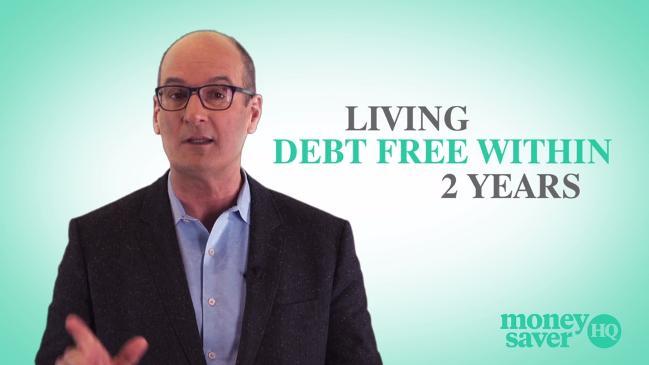Barefoot Investor: Relationships can cloud judgment on tough financial decisions
BANKRUPTCY, credit cards, and loans are all stressful. But when it comes to tackling your debt demons then relationships can often cloud your financial judgment, says the Barefoot Investor.

Barefoot Investor
Don't miss out on the headlines from Barefoot Investor. Followed categories will be added to My News.
BANKRUPTCY, credit cards, and loans are all stressful. But when it comes to tackling your debt demons then relationships can often cloud your financial judgement and decisions.
When you’re regaining control of your money, Barefoot Investor cuts to the chase with some words of wisdom on the bottom line.
JEN ASKS: Sadly, my husband has just been advised that his cancer has moved to “terminal” (he is only 48).
We are devastated, but the reality is we have to make some hard decisions about where to go from here.
Luckily, we have always believed in having life insurance, and that will more than cover the mortgage, so financially my boys (10 and 13) and I will be OK. But I want to make sure it stays that way.
After ensuring we are debt free, I want to invest some money for the boys, and I am torn between AFIC shares and investment bonds.
Any advice would be appreciated — we have so many decisions to make.

BAREFOOT REPLIES: My heart breaks for your family. The simple answer is “yes” — buy some shares in AFIC.
But there’s nothing simple about your situation. If I was your husband, my only wish would be to make sure that my family was financially secure. So let’s grant him that wish.
Speak to his super fund immediately and lodge an application for a terminal illness condition of release, which will have to be signed by two doctors (one a specialist).
This will give you access to his death benefit now, instead of having to wait. Then, sit down as a family and discuss what you’re going to do.
Now here’s the really important point — turn this into a life lesson for your boys. Explain to them that you’re going to be OK because their father is a good provider who made sensible financial decisions, like taking out adequate insurance.
When you get the payout, pay off the mortgage, put something aside for a final holiday together (or to pay hospital expenses), put three months of living expenses in a mojo savings account (extra if you’re taking a break from work), buy your AFIC shares, and park the rest in a 12-month term deposit so you can allow yourself time to grieve. The best way to look after your sons is to be financially strong yourself.
HOW TO DETONATE YOUR CREDIT CARD DEBT

FOR LOVE OR MONEY
MELANIE ASKS: I’m in love! I met a guy six months ago, and he’s now moving into my house and wants to put his income into paying down my mortgage while we use my income to live on.
I am on $105,000 and he is on a $90,000 base (more with overtime).
He has no debt, while I owe $330,000 on my home, $250,000 on an investment property (barely breaking even), and $20,000 on my credit card (from a holiday).
We are going to get married eventually, but the plan is to live together and pay down my mortgage for a couple of years until we need more space for kids.
The trouble is, I do not want him taking on my debt, so should I sell and start again together?
BAREFOOT REPLIES: “I feel it in my fingers, I feel it in my toes, when love is all around me …” … you’ll probably make dumb money decisions.
Seriously, I’ve had little lambs last longer than you’ve known this bloke. (And you know what eventually happens to them, don’t you?)
A few things: first, keep everything separate until he puts a ring on it. If you want to live in sin (as my grandmother calls it), charge him rent, and pay that straight off your mortgage. Easy.
Second: get rid of the credit card debt pronto. (Seriously? On a holiday? WTF?) Do the sums on your investment property and then ask yourself the ultimate question: would I buy this property again today? If not, get rid of it.
Now is the time to get on top of your debts. But don’t do it for him. Do it for you. Repeat after me: “This man isn’t my financial plan.”
Finally, it sounds like you’ve fallen hard for this bloke. The best way to see if he is as committed to your future as you are (other than checking his phone) is to sit back and watch what he does for the next 12 months.
If he’s serious, he’ll be working and saving like a man possessed ... “come on and let it show!”
HOW TO STOP WORRYING ABOUT MONEY

THE TEAM GAME
NATALIE ASKS: I need your help. I am 34, on maternity leave and near broke … though still inspired by my five-month-old baby.
I should be secure, relaxed and focusing my energy on the bub (despite the sleepless nights).
The trouble is, in my 20s, I racked up credit card debt to the value of $7000. Years ago I took out a “zero balance” transfer to another bank and it has now grown to $17,000!
I am ashamed, but have come clean about it with my partner. He just handed me your book and I am now in “Debt Domino” mode, gradually paying it down on my $88,000 wage. But what else can I do?
BAREFOOT REPLIES: Well done for facing your debt demons. Trust me, everything gets easier from here. Doing the Debt Domino (paying off your debts smallest to largest) will build up your self-confidence, while systematically knocking down your debts.
However, before you start knocking down the dominoes, I’d like you to check how long it’s been since you made a repayment.
Reason being, if you haven’t touched it for six years you may find that it’s a “statute-barred” debt and you may not be legally required to repay it (note: your credit rating will be shot if you don’t pay, but that will eventually go away, too).
Now, do me a favour and pass me over to your partner. Go on, do it. I’ll wait.
Hey, champ! Well done for giving your partner my book — it’s a great first step, but you need to do more.
See, this amazing woman is not only the mother of your children, but your partner in life. You need to work together on knocking out these debts as a team. There’s only upside for you
First, you get out of debt quicker; second, you build strong financial habits that will ultimately change (or prune) your family tree; and third, you’ll have a happier wife … and a happier life.
THE VERDICT ON THE FIRST HOME SUPER SAVER SCHEME

MUM’S THE WORD
HELEN ASKS: I knew my mum had debt, but when she finally ’fessed up, I was absolutely shocked.
She owes $90,000 in credit cards and personal loans due to gambling and spending. She is aged 60, has $120,000 in super and earns $2000 a fortnight.
She lives with my brother and pays no bills. She has now agreed to turn things around and has given her credit cards to me. Please help.
BAREFOOT REPLIES:
You should congratulate your mother for admitting the extent of her financial problems — that’s a really big step.
No doubt she feels a lot of shame about her situation.
Now, you both need to be realistic about the hole she’s in: gambling addiction is a horrible disease that takes a lot of time and a lot of effort to treat.
Having your mum hand over her credit cards is a symbolic step — kind of like an alcoholic tipping their booze down the sink — but it doesn’t stop her from going out and poking the pokies when she gets a craving.
Here’s my thinking: if your mum doesn’t have any assets, she could look at declaring bankruptcy.
Reason being, after you’re declared bankrupt, you can earn up to $54,736.50 per annum before having to make repayments to your trustee — and your mum earns under that.
In other words, she could stiff her creditors, wipe out her consumer debts, and keep all her income. Just writing that makes me feel physically ill — but that’s the dollars and cents of it.
Once she’s got that sorted, she has an even bigger hurdle to face: she has reached her preservation age, and she’ll be able to access all her super in five years. If she’s not on top of her gambling addiction, there’s a chance she’ll blow it. Then she’ll be the one who gets stiffed ... by the casino.
— Scott Pape’s regular column will return next week.
The Barefoot Investor holds an Australian Financial Services Licence (302081). This is general advice only. It should not replace individual, independent, personal financial advice

Originally published as Barefoot Investor: Relationships can cloud judgment on tough financial decisions
